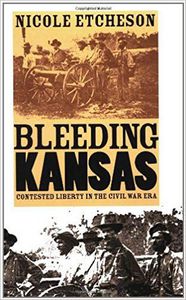|
Bleeding Kansas - Contested Liberty in the Civil War Era
|
|
Nicole Etcheson
|
|
University Press of Kansas (2006)
|
In Collection
#1775
|
|
0*
|
|
History
|
|
Kansas, History / United States / State & Local / Midwest (IA, IL, IN, KS, MI, MN, MO, ND, NE, OH, SD, WI), History / United States / Civil War Period (1850-1877)
|
9780700614929
English
|
Few people would have expected bloodshed in Kansas Territory. After all, it had few slaves and showed few signs that slavery would even flourish. But civil war tore this territory apart in the 1850s and 60s, and "Bleeding Kansas" became a forbidding symbol for the nationwide clash over slavery that followed. Many free-state Kansans seemed to care little about slaves, and many proslavery Kansans owned not a single slave. But the failed promise of the Kansas-Nebraska Act--when fraud in local elections subverted the settlers' right to choose whether Kansas would be a slave or free state--fanned the flames of war. Nicole Etcheson seeks to revise our understanding of this era by focusing on whites' concerns over their political liberties. The first comprehensive account of "Bleeding Kansas" in more than thirty years, her study re-examines the debate over slavery expansion to emphasize issues of popular sovereignty rather than slavery's moral or economic dimensions. The free-state movement was a coalition of settlers who favored black rights and others who wanted the territory only for whites, but all were united by the conviction that their political rights were violated by nonresident voting and by Democratic presidents' heavy-handed administration of the territories. Etcheson argues that participants on both sides of the Kansas conflict believed they fought to preserve the liberties secured by the American Revolution and that violence erupted because each side feared the loss of meaningful self-governance. "Bleeding Kansas is a gripping account of events and people--rabble-rousing Jim Lane, zealot John Brown, Sheriff Sam Jones, and others--that examines the social milieu of the settlersalong with the political ideas they developed. As Etcheson demonstrates, the struggle over the political liberties of whites may have heightened the turmoil but led eventually to a broadening of the definition of freedom to include blacks. Her insightful re-examination sheds new light on this era and is essential reading for anyone interested in the ideological origins of the Civil War.
| No. of Pages |
370 |
| Height x Width |
9.1
x
6.0
inch |
|
|
|
